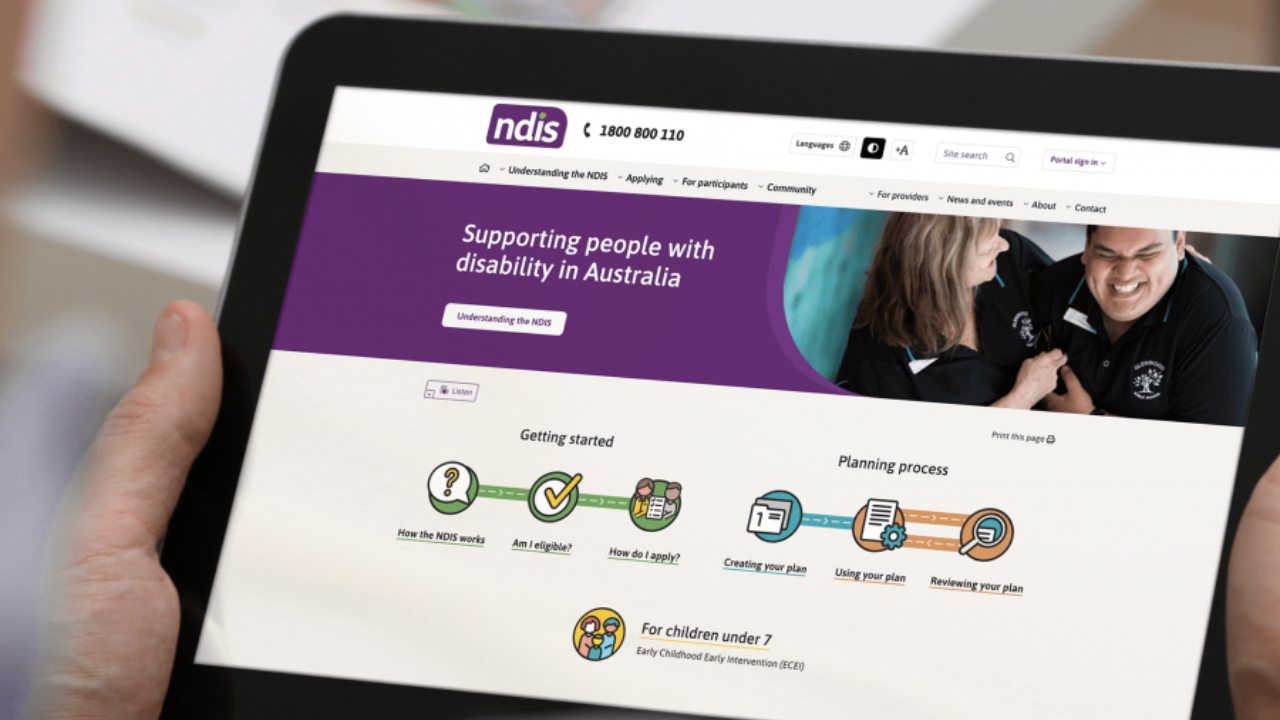Understanding Misleading NDIS Product Claims
As the National Disability Insurance Scheme (NDIS) continues to expand across Australia, more providers are entering the market to supply goods and services to NDIS participants. However, this growth has also led to an increase in misleading NDIS product claims.
Some providers advertise their products as ‘NDIS approved’ or ‘NDIS permitted’ without proper verification, which can mislead participants.
Some businesses use false or misleading advertising to imply that their products are NDIS approved or NDIS endorsed, even when the National Disability Insurance Agency (NDIA) has not verified them. These misleading statements can lead to confusion, wasted NDIS funds, and breaches of the NDIS Code of Conduct.

The NDIS Quality and Safeguards Commission has made it clear that any provider making false or misleading representations may face enforcement action and significant penalties.
Read more about your rights and provider obligations at the NDIS Quality and Safeguards Commission.
Participants and authorities have raised concerns about the increase in misleading advertising and its impact on vulnerable consumers.
What Are Misleading or False Claims Under the NDIS?
Misleading claims occur when NDIS providers or businesses use advertising and marketing materials to make promises that are inaccurate, exaggerated, or unsubstantiated.
For example:
- Claiming a product is “NDIS certified” when the NDIS Commission does not issue such certifications.
- Advertising assistive technology as “guaranteed to be covered under the NDIS”.
- Suggesting a product is “NDIS permitted” without approval from the National Disability Insurance Agency (NDIA).
- Using the NDIS logo or brand to imply official endorsement.
Some misleading advertising practices specifically target NDIS participants by falsely claiming services or endorsements to encourage purchases.
The Australian Competition and Consumer Commission (ACCC) states that such misleading representations breach Australian Consumer Law, especially when targeting vulnerable consumers.
How Misleading Advertising Affects NDIS Participants

NDIS participants rely on accurate information to make informed choices about their supports, whether it is for assistive technology, personal care, or recreational activities.
When businesses promote false claims, NDIS participants may:
- Spend their NDIS funds on ineligible or non-compliant claims.
- Receive goods or services that fail to meet their disability needs.
- Be misled into believing products are approved or covered when they are not.
- Lose confidence in genuine registered NDIS providers.
Misleading claims can result in NDIS participants purchasing ineligible supports that are not covered by the scheme, exposing them to financial loss and risk.
This not only wastes money but undermines the integrity of the National Disability Insurance Scheme (NDIS) and the NDIS Quality and Safeguards framework.
Common Examples of Misleading NDIS Product Claims
Here are some examples seen in advertising and marketing campaigns across Australia:
- Meal delivery services claiming to “cover food expenses” through NDIS funding codes, even though food expenses are typically ineligible under the scheme.
- Theme park passes or all-inclusive holidays marketed as NDIS funded, despite not being directly related to a participant’s plan or included in the participant’s plan.
- Aged care providers promoting products as dual-funded under aged care and NDIS, which is not permitted.
- NDIS equipment listed at inflated prices and labelled as “exclusive” or “NDIS-approved”.
The NDIS does not officially endorse or approve any particular goods or services, and providers should not claim otherwise.
Participants should always confirm eligibility with their plan manager, support coordinator, or directly with the NDIA before purchasing.
You can find accurate information on funded supports at the NDIS website.
NDIS Provider Responsibilities: Ensuring Compliance with the NDIS Code

NDIS providers play a vital role in upholding the integrity and quality of the National Disability Insurance Scheme (NDIS). Under the NDIS Code of Conduct, all providers are required to ensure their advertising and marketing materials are honest, transparent, and free from false or misleading representations. This means avoiding any misleading claims about NDIS funding, NDIS approved products, or NDIS assistive technology, and never suggesting NDIS endorsement or approval unless explicitly granted by the National Disability Insurance Agency.
Compliance with both Australian Consumer Law and the NDIS Quality and Safeguards Commission’s standards is not optional—it’s a legal and ethical obligation. Providers must accurately represent the services and supports they offer to NDIS participants, ensuring that all claims in their advertising are truthful and substantiated. Any breach, such as making false or misleading statements about NDIS funding or falsely advertising products as NDIS approved, can result in significant penalties, including fines and reputational damage.
By adhering to the NDIS Code and maintaining high standards in their advertising and marketing materials, NDIS providers help protect participants, support informed choices, and contribute to the overall quality and trustworthiness of the disability insurance scheme NDIS.
The Role of the NDIS Quality and Safeguards Commission

The NDIS Quality and Safeguards Commission oversees provider compliance, ensures NDIS registered providers meet required standards, and enforces the NDIS Code of Conduct.
When a provider is found to have made false or misleading claims, the Commission can:
- Issue infringement notices.
- Suspend or revoke provider registration.
- Launch investigations under Australian Consumer Law.
- Publish warnings on their news page.
The Safeguards Commission works closely with the Australian Competition and Consumer Commission (ACCC) to protect consumers and maintain trust in the NDIS.
National Disability Insurance Agency Oversight: Protecting Participants from Misleading Claims

The National Disability Insurance Agency (NDIA) is committed to safeguarding NDIS participants from misleading advertising and false claims. Working closely with the NDIS Quality and Safeguards Commission and the Australian Competition and Consumer Commission (ACCC), the NDIA actively monitors provider compliance with the NDIS Code and Australian Consumer Law.
When providers make false or misleading claims—whether in advertising, service descriptions, or promotional materials—the NDIA can take enforcement action. This includes issuing infringement notices, imposing significant penalties, and, in serious cases, revoking provider registration. These measures are designed to protect vulnerable consumers and ensure that NDIS participants can make informed choices about their supports and services.
The NDIA also provides clear guidance and resources to help both participants and providers understand their rights and responsibilities under the NDIS. By maintaining strict oversight and collaborating with consumer protection agencies, the NDIA upholds the quality and integrity of the national disability insurance scheme, ensuring that participants receive accurate information and are shielded from exploitation and misleading representations. This ongoing commitment helps build trust in the NDIS and supports the delivery of high-quality, compliant services to all participants.
The Legal Framework: Australian Consumer Law and NDIS
All NDIS providers must follow both the NDIS Act 2013 and Australian Consumer Law (ACL). Under ACL, it is illegal to make false or misleading advertising, including claims about pricing, benefits, or approvals.
The ACCC and the NDIS Commission collaborate to identify non-compliant claims and penalise businesses making false or misleading representations.
Even unintentional errors, such as incorrect pricing on a website, Google Ads, or printed brochures, can still be deemed misleading if they confuse consumers.
Why Some Businesses Make False or Misleading Claims
Some businesses intentionally misrepresent their products to appear more attractive to NDIS participants and gain more sales. Others may misunderstand NDIS funding decisions or use outdated information about approved and NDIS-permitted supports.
Common motivations include:
- Trying to reach plan managed participants directly.
- Misinterpreting NDIS funding codes.
- Taking advantage of participants’ trust in official branding.
- Failing to seek NDIA endorsement before promoting certain products.
Regardless of intent, such actions violate law and NDIS compliance standards.
The Consequences of Misleading Representations
Registered NDIS providers who make misleading claims may face:
- Cancellation of their NDIS registration.
- Financial penalties under Australian Consumer Law.
- Public naming on the NDIS Commission’s enforcement register.
- Possible prosecution if the misleading advertising involves deliberate fraud.
These measures help uphold the integrity of the National Disability Insurance Scheme and ensure participants receive accurate supports through trusted providers.
How Participants Can Protect Themselves from Misleading NDIS Product Claims

To avoid being misled, NDIS participants can take a few simple steps:
- Verify the provider’s registration using the NDIS Provider Register.
- Ask for written proof of funding eligibility before purchasing.
- Discuss potential purchases with your plan manager or support coordinator.
- Report misleading claims to the NDIS Commission complaints page or the ACCC consumer issues form.
- Always ensure that the product or service aligns with your participant’s plan goals and approved supports.
Examples of False Advertising / Misleading NDIS Product Claims Detected by the System
Recent investigations have uncovered non-compliant claims such as:
- Businesses promoting NDIS consumables unrelated to a participant’s disability.
- Websites using the term “approved NDIS support” without authorisation.
- Services like meal delivery and recreational packages disguised as “core supports”.
- Products marketed as providing therapeutic benefits without evidence-based research.
The NDIS Commission continues to monitor these activities and works to uphold NDIS quality standards that protect participants.
The Importance of Informed Choices

The NDIS empowers people with disability to make informed choices about their supports and services. By staying alert to false or misleading claims, participants can ensure their funding goes toward products and programs that genuinely improve independence and quality of life.
Understanding your consumer rights and the difference between approved supports and ineligible services can help protect both your budget and wellbeing.
How Re.Connect Support Services Helps You Stay Protected with Misleading NDIS Product Claims
At Re.Connect Support Services, we help NDIS participants make safe, informed, and confident choices about their supports. Our team guides you through the NDIS funding process, connects you with registered NDIS providers, and helps you understand your rights under the NDIS Quality and Safeguards framework.
We work with participants to ensure every purchase and service aligns with NDIS-permitted supports, your plan goals, and funding codes. Whether it is confirming provider compliance or verifying product eligibility, we make sure your NDIS funds are used wisely and effectively.
To learn more about how Re.Connect can help you stay safe from misleading NDIS product claims, visit Re.Connect Support Services.
Final Thoughts on Misleading NDIS Product Claims

The rise in misleading NDIS product claims is a reminder that participants must stay vigilant and informed. By checking facts, verifying providers, and understanding your rights under Australian Consumer Law, you can protect your plan and ensure your supports deliver the right results.
With trusted guidance from organisations like Re.Connect Support Services, you can focus on what truly matters: achieving your goals, building independence, and living your best life through the National Disability Insurance Scheme.

